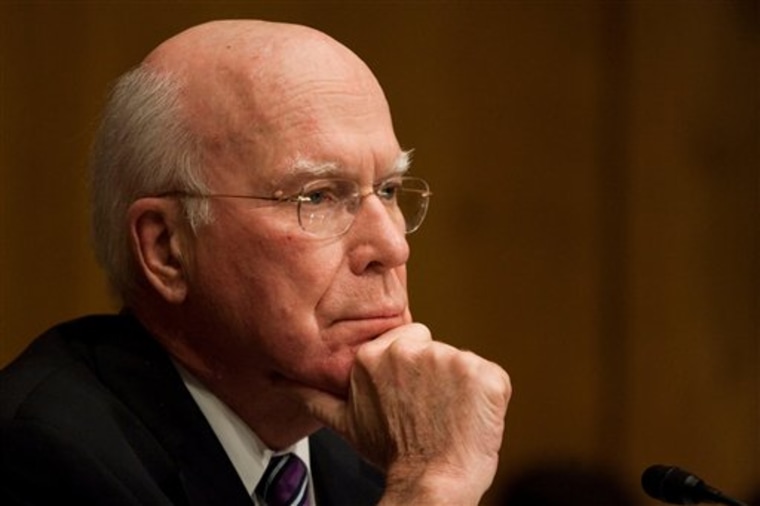Senate Democrats on Wednesday suggested Republicans should join their call for a nonpartisan "Truth Commission" to probe whether the Bush administration abused its power, or face partisan congressional investigations.
The GOP response: forget it.
Sen. Patrick Leahy, chairman of the Judiciary Committee, was supported in his commission proposal by a former career diplomat and a retired admiral. But he told a hearing he convened that if Republicans "remain absent or resistant, this opportunity can be lost."
He said the alternative was "accountability through more traditional means" — defined by Leahy's aides as congressional hearings controlled by Democrats.
Both moderate and conservative Republicans made clear to Leahy, D-Vt. that they'll take their chances with the alternatives to a "Truth Commission."
Sen. Arlen Specter, R-Pa., ranking GOP member on the committee, said he opposes the "Truth Commission" because Democrats "can walk in the front door" of the Justice Department and "ask directions to the relevant filing cabinet."
Specter has often criticized the former administration's assertion of extraordinary powers to fight the war on terror, but said the commission is unnecessary.
Specter is considered a moderate and a maverick. Sen John Cornyn, R-Texas, part of his party's conservative wing, added: "The idea that this so-called Truth Commission would somehow resolve the good-faith disagreements ... is just asking us to believe in the tooth fairy." He said he's willing to have Congress do the job itself.
The Justice Department is, in fact, opening the file drawers to make public the formerly secret Bush administration memos on counterterrorism.
The documents released Monday by the department showed the Bush administration determined that certain constitutional rights would not apply as the U.S. stepped up its response to terrorism.
Within two weeks of the Sept. 11, 2001 attacks, government lawyers were discussing ways to wiretap U.S. conversations without warrants, the documents showed.
The Bush administration eventually abandoned many of the legal conclusions, but the documents themselves had been closely held.
Leahy hasn't yet introduced a bill that would show the composition of a commission. The chairman of the House Judiciary Committee, John Conyers of Michigan, has introduced legislation for a similar commission.
"There should not be a focus on retribution or payback, and such an effort should not be used for partisan purposes," said Sen. Russell Feingold, D-Wis., a supporter of the commission. He told Leahy, "That is why your proposal, Mr. Chairman, is so important. Your proposal is aimed at finding the truth, not settling scores."
Thomas Pickering, ambassador to the United Nations under former President George H. W. Bush, gave Leahy's idea strong support at the Senate hearing.
"We must, as a country, take stock of where we might have been and determine what was not acceptable, what should not have been done, and what we will never do again," he said. "It is my sincere hope that this commission will confront and reject the notion, still powerful in our midst, that these policies are proper choices that could be implemented again in the future."
Retired Vice Adm. Lee Gunn, part of a coalition of retired admirals and generals opposing torture, added that members of his group have conflicting views on whether to prosecute those who carried out harsh interrogations.
"But we all believe that we cannot move forward without looking back and examining how our country got so far off track," he said.
Republicans countered with Jeremy Rabkin, a George Mason University professor of constitutional law, who concluded, "What many advocates of a 'Truth Commission' seem to have in mind is not simply an exercise in gathering facts but in assessing blame."
